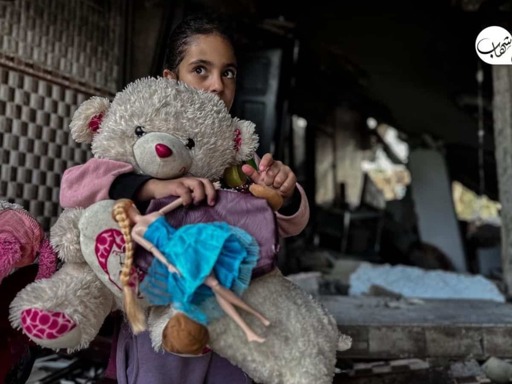In one of the displacement camps in Khan Younis, amidst rows of tents where dust mingles with the smell of gunpowder, ten-year-old Jamila Basla sits silently, her hand hidden behind her back, watching Gaza children from afar. She once ran among them with lightness and joy, before play turned to crime, and a packet of Indomie noodles became a deadly trap.
Days earlier, an official source in the Palestinian Ministry of Health revealed that the occupation forces had left behind booby-trapped toys and other explosive materials among the rubble of homes and in displacement areas of the southern Gaza Strip, in what the ministry described as “a continuation of the policy of extermination and targeting of children even after talk of a ceasefire.”
Gaza children negotiating death traps
Jamila was one of the victims of these traps. While searching for something to bring her a taste of life amidst the oppression and hunger, she spotted a packet of Indomie noodles lying on the ground. She picked it up with childlike joy, and moments later a small explosion shook the tent and blood splattered on the ground.
Her mother, fighting back tears, says:
I ran to her and found her hand bleeding, her fingers torn off, her face twisted in pain… From that day on, she wasn’t the same as before.
Today, the child suffers from fainting spells, learning difficulties, and psychological distress. Doctors confirm that her condition is complex, involving both neurological and orthopaedic injuries, leaving her trapped between physical pain and recurring nightmares.
Despite her mother’s attempts to encourage her to play again, Jamila prefers to sit silently near her tent, hiding her severed hand behind her back. Whenever someone approaches, she whispers a single word: “I want a finger.”
A Childhood Trapped by Death
Jamila’s story is not unique. According to reports from the United Nations Children’s Fund (UNICEF), more than 50,000 children have been killed or injured in Gaza since October 2023. Save the Children reports that at least 15 children a day suffer permanent disabilities due to bombings or unexploded ordnance.
Reuters and international demining agencies warn that Gaza has become an “open killing field,” with the removal of explosives estimated to take more than 30 years. The Associated Press (AP) confirmed that many child injuries were caused by small bombs mistaken for toys or shiny objects, which exploded in their hands.
Incomplete Memories and Severed Dreams
In the displacement camp, Jamila gazes silently at the sky, remembering the day of the explosion. She tries to laugh, but hides her severed hand. When the mothers in the camp see her, they whisper bitterly:
She was playing… as if playing has become a crime.
This is how Jamila encapsulates the story of an entire generation, a generation snatched from the pages of books and the games of the neighbourhood, finding itself growing up amidst destruction. A child who dreamed of a small meal lost both her finger and her childhood, in a land where food, dreams, and play have become different faces of death.
Featured image via Times of Gaza
By Alaa Shamali
From Canary via this RSS feed


